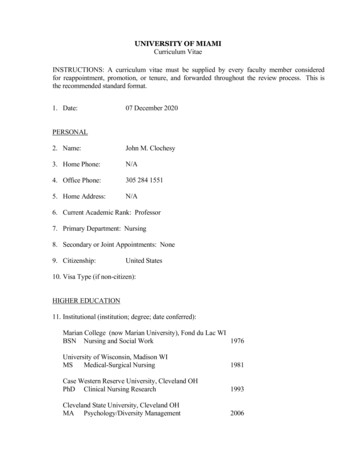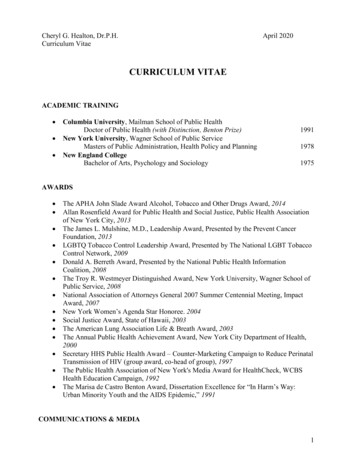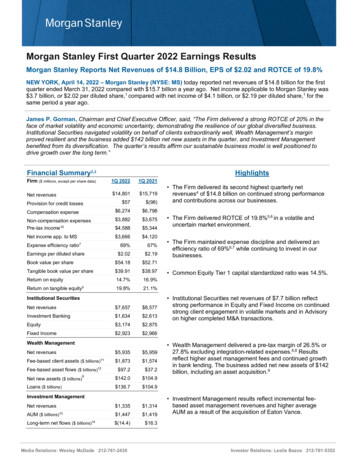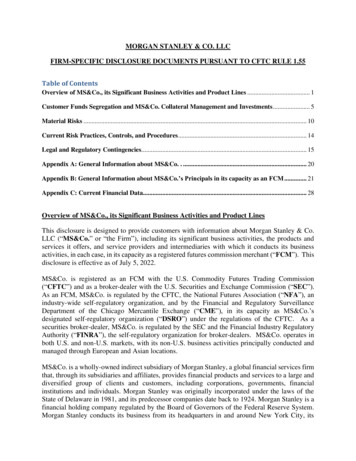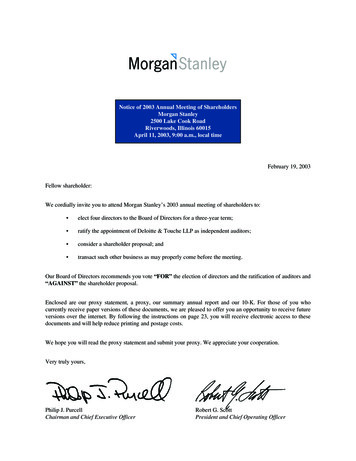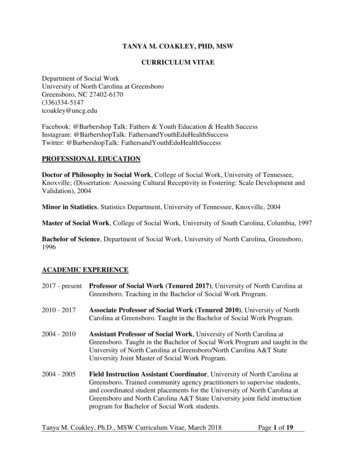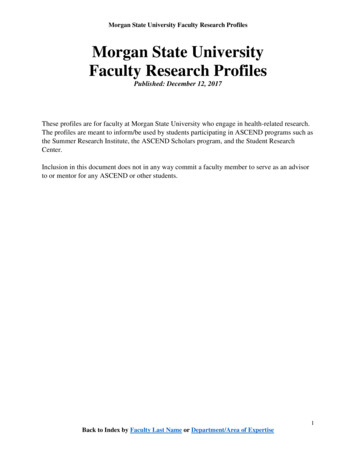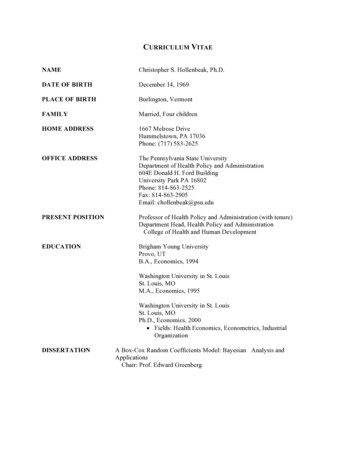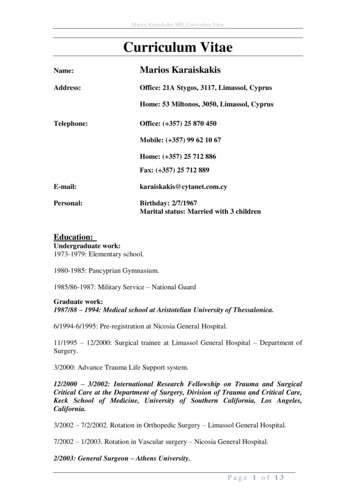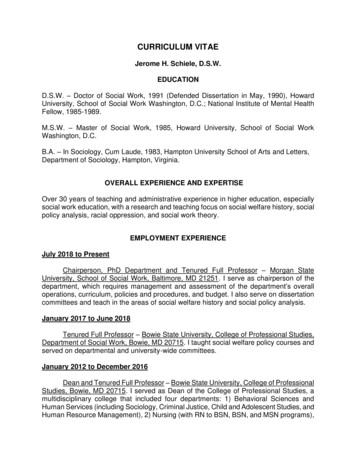
Transcription
CURRICULUM VITAEJerome H. Schiele, D.S.W.EDUCATIOND.S.W. – Doctor of Social Work, 1991 (Defended Dissertation in May, 1990), HowardUniversity, School of Social Work Washington, D.C.; National Institute of Mental HealthFellow, 1985-1989.M.S.W. – Master of Social Work, 1985, Howard University, School of Social WorkWashington, D.C.B.A. – In Sociology, Cum Laude, 1983, Hampton University School of Arts and Letters,Department of Sociology, Hampton, Virginia.OVERALL EXPERIENCE AND EXPERTISEOver 30 years of teaching and administrative experience in higher education, especiallysocial work education, with a research and teaching focus on social welfare history, socialpolicy analysis, racial oppression, and social work theory.EMPLOYMENT EXPERIENCEJuly 2018 to PresentChairperson, PhD Department and Tenured Full Professor – Morgan StateUniversity, School of Social Work, Baltimore, MD 21251. I serve as chairperson of thedepartment, which requires management and assessment of the department’s overalloperations, curriculum, policies and procedures, and budget. I also serve on dissertationcommittees and teach in the areas of social welfare history and social policy analysis.January 2017 to June 2018Tenured Full Professor – Bowie State University, College of Professional Studies,Department of Social Work, Bowie, MD 20715. I taught social welfare policy courses andserved on departmental and university-wide committees.January 2012 to December 2016Dean and Tenured Full Professor – Bowie State University, College of ProfessionalStudies, Bowie, MD 20715. I served as Dean of the College of Professional Studies, amultidisciplinary college that included four departments: 1) Behavioral Sciences andHuman Services (including Sociology, Criminal Justice, Child and Adolescent Studies, andHuman Resource Management), 2) Nursing (with RN to BSN, BSN, and MSN programs),
2EMPLOYMENT EXPERIENCE (Cont'd)3) Psychology, and 4) Social Work. The College enrolled over 1800 students (over 1500undergraduate and over 200 graduate students) and included approximately 100 facultymembers (47 full-time) and 10 staff persons. As the Chief Administrative Officer, I wasresponsible for managing and maintaining the academic and fiscal affairs, integrity, andeffectiveness of the College of Professional Studies, which had an annual operating budgetof over 6 million dollars. I provided leadership in shaping the College’s vision and missionand in implementing the delivery of its educational services. I also established andmaintained community partnerships and external relations.A few major accomplishments of the College of Professional Studies during my fiveyears as Dean were as follows: 1) the College generated almost 4 million in extramuralfunding, and the scholarly productivity of the faculty significantly increased; 2) the Collegemaintained high enrollment, retention, and graduation numbers; 3) the Master of Science inNursing (MSN) program received full reaffirmation by the Accreditation Commission forEducation in Nursing; 4) successful outcomes were achieved for the periodic academicreview of programs required by the Maryland Higher Education Commission; and 5) globallearning opportunities in Cuba, Germany, South Africa, and Japan were established.July 2009 to December 2011Associate Dean and Tenured Full Professor – The University of Georgia School ofSocial Work, Athens, GA 30602. I served as associate dean with responsibility for theoversight, coordination, and assessment of four academic and instructional programs,totaling over 500 students, 40 faculty, and 20 staff at the baccalaureate, master’s, andPh.D. levels of education. I worked closely with directors of four programs (BSW, MSW,Master of Non-Profit Organizations, and PhD) to ensure the quality and consistency ofcurriculum delivery. I assisted in developing, managing, and implementing the school’salmost 4 million-dollar operating budget and determining salary levels and resource needsfor faculty and staff. In this role, I also led and coordinated the school’s SACS (SouthernAssociation of Colleges and Schools) and CSWE (Council on Social Work Education, 2008Educational Standards) reaccreditation efforts, both of which were enormously successful.Finally, I provided oversight and leadership of the school’s information technology officeand served as the coordinator of the school’s graduate programs. As professor, I taughtacross programs, but primarily in the master’s program, and served on dissertationcommittees. My primary teaching areas were research methods, cultural diversity, andoppression studies.August 2005 – June 2009Founding Director of Ph.D. Program and Tenured Full Professor – Morgan StateUniversity, Department of Social Work, Baltimore, MD 21251. I helped to establish andserved as the first director of the Ph.D. program in social work. In this role, I lead thedevelopment of the program’s curriculum and policies and procedures and developed and
3EMPLOYMENT EXPERIENCE (Cont'd)managed the program’s budget. Also, in this role, I served as co-chair of the leadershipcommittee of the University’s Middle States Accreditation Self Study Task Force.Establishing this program was significant in that it represented only the 5th Ph.D. program insocial work in the nation to be located at a Historically Black University. As professor, Itaught in the Ph.D. program and in the newly formed M.S.W. program, with primaryteaching areas being social welfare history, social policy analysis, and social work theory.August 2004 – May 2005Interim Director of DSW Program - Norfolk State University, School of Social Work,Norfolk, VA 23504. I served as administrator of the program and was responsible forleading and managing the program’s budget, operations, curriculum delivery, andassessment.August 2002 – May 2005Tenured Full Professor – Norfolk State University, School of Social Work, Norfolk,VA 23504. I taught in the doctoral program. My primary teaching areas were social welfarehistory and social policy analysis. I also supervised doctoral dissertations.August 1996 - August 2000Director of Ph.D. Program - Clark Atlanta University, School of Social Work, Atlanta,GA 30314. I served as administrator of the program, which included approximately 40students and 4 core faculty members. In this role, I was responsible for leading andmanaging the program’s budget, operations, curriculum delivery, and assessment.August 1994 – August 2002Associate Professor (Tenured in 1999) - Clark Atlanta University, School of SocialWork, Atlanta GA 30314. I taught in the M.S.W. and Ph.D. programs. My primary teachingareas were social welfare history, social policy analysis, and research methods/statistics. Ialso supervised both master’s theses and doctoral dissertations.August 1992 – August 1994Director of MSW Program – State University of New York at Stony Brook, HealthSciences Center, School of Social Welfare, Stony Brook, New York 11794. I served asadministrator of the program, which included approximately 250 students and 20 facultymembers. In this role, I was responsible for leading and managing the program’s curriculumdelivery and budget, and collaborating closely with the Associate Dean and Dean onoperational matters pertaining to the School of Social Welfare. During my tenure, the MSWprogram was reaccredited by the Council on Social Work Education.
4EMPLOYMENT EXPERIENCE (Cont'd)August 1993 – May 1994Adjunct Professor – Adelphi University School of Social Work, Garden City, NewYork 11530. I served as an adjunct professor in the MSW program where I taught researchand history and philosophy of social welfare.August 1993 – December 1993Adjunct Professor – State University of New York, Empire State College, OldWestbury, New York 11568. I served as an adjunct professor in the undergraduateprogram where I taught a social work introductory course.August 1990 - July 1994Assistant Professor - State University of New York at Stony Brook, Health SciencesCenter, School of Social Welfare, Stony Brook, New York 11794. I taught in the MSW andBSW programs. My primary teaching areas were research methods and statistics, socialwelfare policy, and human behavior theory. I also supervised master’s research projects.March 1990 - August 1990Research Consultant - Joint Center for Political & Economic Studies, 1301Pennsylvania Avenue, N.W. Suite 400, Washington, D.C. 20004. I analyzed data andprepared statistical summaries, projections, and reports.April 1985 - June 1988Program Assistant - Department of Human Services, Mental Retardation andDevelopmental Disabilities Administration, Washington, D.C. 20001. I assisted inadministrative activities such as developing policies and procedures and designing andimplementing program evaluations.PUBLICATIONSAuthored BooksSchiele, J.H., Menzise, J. (Contract Received/In Progress). Human Services and theAfrocentric Paradigm (2nd Edition). New York and London: Routledge Press. Thisauthored book is a revision of the earlier 2000 book and includes new chapters that focus on mentalhealth/clinical aspects and approaches of the Afrocentric paradigm.Day, P. J. and Schiele, J.H. (Contract Received/In Progress). A New History of SocialWelfare (8th Edition.). New York: Oxford University Press. This co-authored book representsthe 8th edition of the original editions and includes new chapters on President
5PUBLICATIONS (Cont’d)Trump and President Obama’s second term and updated material that includes more focus on thesocial welfare and protest activities of people of color.Day, P. J. and Schiele, J.H. (2013). A New History of Social Welfare (7th Ed.). Boston:Pearson. This co-authored book covers over 500 pages, including references and the index, andincludes 15 chapters. As with the previous editions, the 7th edition examines the historical trendsand events that have shaped the institution of American social welfare, including social welfarepolicies and programs.Schiele, J.H. (2000). Human Services and the Afrocentric Paradigm. Binghamton, N.Y.:The Haworth Press, Inc. (The Haworth Press was purchased by Routledge Press). Thissingle authored book covers over 300 pages, including references and the index, and includes 11chapters. This is the first book to apply the Afrocentric paradigm to a wide range of issues andproblems confronted by human service professionals and consumers. In 2000, the book receivedthe Cheikh Anta Diop Award for best book on Afrocentric Theory.Edited BooksSchiele, J.H. (2020). Social Welfare Policy: Regulation and Resistance amongPeople of Color (2nd Edition). San Diego, CA: Cognella Press. This single-edited book isthe revision of the earlier book published in 2011. The new book updates previous chapters andfocuses on race and social policy in the Trump Administration, with considerable attention givento immigration policy.Schiele, J.H. (2011). Social Welfare Policy: Regulation and Resistance amongPeople of Color. Thousand Oaks, CA: Sage Publications. This single edited book coversover 350 pages, including references and the index, and includes 17 chapters. The bookapplies a racism-centered perspective of social policy analysis to examine how social welfarepolicies have regulated the lives of people of color and how people of color have resisted theracial control features of these policies.Guest Editor—Special IssueSchiele, J.H., & Hopps, J.G. (2009). Served as co-editor of a special issue of thejournal, Social Work, entitled Practice Perspectives with Racial and Ethnic Minorities,Vol. 43 (3—July), pp. 193-288. This special issue, which included 9 articles and over 40original submissions, examines how various social work practice perspectives can be used toexplain and alleviate contemporary social problems that disproportionately affect racialminorities.
6Peer Reviewed Journal ArticlesSchiele, J.H., and Jackson, M.S. (2020). The Atlanta School of Social Work and theProfessionalization of “Race Work.” Phylon: The Clark Atlanta University Review ofRace and Culture, Vol. 57(2), pp. 21-40.Teasley, M.L., Schiele, J.H., Adams, C., & Okilwa, N.S. (2018). Trayvon Martin: RacialProfiling, Black Male Stigma, and Social Work Practice. Social Work, Vol 63 (1), pp. 37-45.Schiele, J.H. (2017). The Afrocentric Paradigm in Social Work: A Historical Perspectiveand Future Outlook. Journal of Human Behavior in the Social Environment, Vol. 27(1-2), pp. 15-26.Graham, M., & Schiele, J.H. (2010). Equality-of-oppressions and anti-discriminatory modelsin social work: Reflections from the USA and UK. European Journal of Social Work, Vol.13 (2), pp. 231-244. Also published in C. Williams & M. Graham (2013, Ed.), SocialWork in Europe: Race and Ethnic Relations (pp. 82-95). New York: Routledge.Wells-Wilbon, R., Jackson, N., & Schiele, J.H. (2010). Lessons from the Maafa: Rethinkingthe Legacy of Slain Hip-Hop Icon Tupac Shakur. Journal of Black Studies, Vol. 40 (4), pp.509-526.Schiele, J.H. (2009). Black Political Ideologies: Conceptions of African AmericanSubjugation and Social Welfare Policy Intervention. Journal of Policy Practice, Vol. 8(3), pp. 240-259.Schiele, J.H. (2007). Implications of the Equality-of-Oppressions Paradigm for CurriculumContent on People of Color. Journal of Social Work Education, Vol 43 (1), pp. 83-100.Schiele, J.H. (2005). Cultural Oppression and the High-Risk Status of African Americans.Journal of Black Studies, Vol 35(6), pp. 802-826.Schiele, J.H., Jackson, M.S., & Fairfax, C.N. (2005). Maggie Lena Walker and AfricanAmerican Community Development. Affilia: Journal of Women & Social Work, Vol 20(1),pp. 21-38.Schiele, J.H. (2002). Mutations of Eurocentric Domination and their Implications for AfricanAmerican Resistance. Journal of Black Studies, Vol 32(4), pp. 439-463.Schiele, J.H., & Stewart, R. (2001). When White Boys Kill: An Afrocentric Analysis. Journalof Human Behavior in the Social Environment, Vol 4(4), pp. 253-273; Also publishedin L. See (Ed.) Violence as Seen through a Prism of Color (pp.253-273). Binghamton,N.Y.: Haworth Press.
7PUBLICATIONS (Cont’d)Schiele, J.H., & Wilson, R. (2001). Issues and Guidelines for Promoting Diversity in SocialWork Doctoral Education. Arete, Vol 25(1), pp. 53-66.Schiele, J.H. (1999). E. Franklin Frazier and the Interfacing of Black Sociology and BlackSocial Work. Journal of Sociology & Social Welfare, Vol 26(2), pp. 105-125.Schiele, J.H. (1998). The Personal Responsibility Act of 1996: The Bitter and the Sweet forAfrican American Families. Families in Society, Vol 79(4), pp. 424-432.Schiele, J.H. (1998). Cultural Alignment, African American Male Youths, and Violent Crime.Journal of Human Behavior in the Social Environment, Vol 1(2/3), pp.165-181. Alsopublished in L. See (1998, Ed.), Human Behavior in the Social Environment from anAfrican American Perspective (pp.165-181). Binghamton, N.Y.: Haworth Press.Schiele, J.H. (1997). An Afrocentric Perspective on Social Welfare Philosophy & Policy.Journal of Sociology & Social Welfare, Vol 24(2), pp.21-39.Schiele, J.H. (1997). The Contour and Meaning of Afrocentric Social Work. Journal ofBlack Studies, Vol 27(6), pp.800-819.Schiele, J.H. (1996). Afrocentricity: An Emerging Paradigm in Social Work Practice. SocialWork, Vol 41(3), pp.284-294. Also published in P. Ewalt et al. (1999, Ed.), MulticulturalIssues in Social Work, Vol II (pp.62-77). Washington, D.C.: NASW; Also published inJ.L. Conyers & A. Barnett (1999, Ed.) Africana History, Culture, and Social Policy(pp.199-223). Lanham, MD: Intl. Scholars Publications; and published in A. Mazama(2003, Ed.), The Afrocentric Paradigm (pp.185-200). Trenton NJ: Africa World Press.Schiele, J.H. (1996). Malcolm X's Example for Social Work. Black Caucus: Journal of theNational Association of Black Social Workers, Vol 2(2), pp. 8-20.Schiele, J.H. & Francis, E.A. (1996). The Status of Former CSWE Ethnic Minority DoctoralFellows in Social Work Academia. Journal of Social Work Education, Vol 32(1), pp.3144.Schiele, J.H. (1995). Submission Rates among African-American Faculty: The ForgottenSide of Publication Productivity. Journal of Social Work Education, Vol 31(1), pp.46-54Schiele, J.H. (1994). Afrocentricity: Implications for Higher Education. Journal of BlackStudies, Vol 25(2), pp.150-169. Also published in N. Ba’Nikongo (1997, Ed.), LeadingIssues in African-American Studies (pp.13-26). Durham, NC: Carolina Academic Press.Schiele, J.H. (1994). Afrocentricity as an Alternative World View for Equality. Journal ofProgressive Human Services, Vol 5(1), pp.5-25.
8PUBLICATIONS (Cont’d)Schiele, J.H. (1993). Cultural Oppression, African Americans, and Social Work Practice.Black Caucus: Journal of the National Association of Black Social Workers, Fall (2),pp.20-34.Schiele, J.H. (1992). Scholarly Productivity among Social Work Doctorates: Patternsamong African Americans. Journal of Multicultural Social Work, Vol 2(4), pp.75-90.Schiele, J.H. (1992). Disparities between African American Women and Men on SocialWork Faculty. Affilia: Journal of Women & Social Work, Vol 7(3), pp.44-56.Schiele, J.H. (1991). Publication Productivity of African American Social Work Faculty.Journal of Social Work Education, Vol 27(2), pp.125-134.Schiele, J.H. (1991). An Epistemological Perspective on Intelligence Assessment amongAfrican American Children. Journal of Black Psychology, Vol 17(2), pp.23-36.Schiele, J.H. (1990). Organizational Theory from an Afrocentric Perspective. Journal ofBlack Studies, Vol 21(2), pp.145-162. Also published in N. Ba’Nikongo (1997, Ed.)Leading Issues in African American Studies (pp.27-38). Durham, NC: CarolinaAcademic Press; and in J.D. Hamlet & J.L. Woodyard (1998, Ed.) Afrocentric Notions:Studies in Culture and Communication. Thousand Oaks, Cal: Sage PublicationsPeer Reviewed Book Chapters, Essays, & EditorialsSchiele, J.H., Kirven, J., Joe, S, and Teasley, M. (In Press). IntergenerationalContributions of Black Male Social Work Educators to Combating Racism. In L. Abrams,S. Crewe, A. Dettlaft, and J.H. Williams (Ed.), Social Work, White Supremacy, andRacial Justice. New York: Oxford University Press.Schiele, J.H., Davison, D., and Maith, C. (In Press). White Supremacy and AmericanSocial Policy: Implications for Racism-Centered Policy Practice. In M. Teasley, M.Spencer, and M. Bartholomew (Ed.), Racism and the Grand Challenges for theSocial Work Profession. New York: Oxford University Press.Schiele, J.H. (2021). A Racism-Centered Perspective on U.S. Social Policy. In M.Reisch (4th. Ed.), Social Policy and Social Justice: Meeting the Challenges of aDiverse Society (pp.139-162). San Diego, CA: Cognella Press.Schiele, J.H. (2020). Introduction. In J.H. Schiele (2nd Ed.), Social Welfare Policy:Regulation and Resistance among People of Color (pp. xv-xxxii). San Diego, CA:Cognella Press.
9PUBLICATIONS (Cont’d)Schiele, J.H., Green, K., & Jackson, M.S. (2020). The Welfare Reform Act of 1996:Racial Control and Resistance among African-Americans. In J.H. Schiele (2nd Ed.),Social Welfare Policy: Regulation and Resistance among People of Color (pp. 224240). San Diego, CA: Cognella Press.Schiele, J.H. (2020). Conclusion. In J.H. Schiele (2nd Ed.), Social Welfare Policy:Regulation and Resistance among People of Color (pp. 241-247). San Diego, CA:Cognella Press.Schiele, J.H. (2019). Social Policy and the Racial Regulation of People of Color. In M.Reisch (3rd. Ed.), Social Policy and Social Justice: Meeting the Challenges of aDiverse Society (pp.133-158). San Diego, CA: Cognella Press.Schiele, J.H. (2017). Social Policy and the Racial Regulation of People of Color. In M.Reisch (2nd. Ed.), Social Policy and Social Justice: Meeting the Challenges of aDiverse Society (pp.137-161). San Diego, CA: Cognella Press.Schiele, J.H. (2013). Social Policy and the Racial Regulation of People of Color. In M.Reisch (Ed.), Social Policy and Social Justice (pp. 125-149). Thousand Oaks, CA:Sage Publications.Schiele, J.H. & Hopps, J.G. (2012). Racism Continues to Plague People of Color. InH.M. Haugen (Ed.), Race in Ralph Ellison’s Invisible Man (pp.135-142). Farmington,MI: Greenhaven Press.Schiele, J.H. (2011). Introduction. In J.H. Schiele (Ed.), Social Welfare Policy:Regulation and Resistance among People of Color (pp. 1-21). Thousand Oaks, CA:Sage Publications.Schiele, J. H., & Gadsden, E. (2011). Racial Control and Resistance among AfricanAmericans in the Aftermath of the Welfare Reform Act of 1996. In J.H. Schiele (Ed.),Social Welfare Policy: Regulation and Resistance among People of Color (pp. 91110). Thousand Oaks, CA: Sage Publications.Schiele, J.H. (2011). Conclusion. In J.H. Schiele (Ed.), Social Welfare Policy:Regulation and Resistance among People of Color (pp. 349-356). Thousand Oaks,CA: Sage Publications.Schiele, J.H. & Hopps, J.G. (2009). Racial Minorities Then and Now: The ContinuingSignificance of Race. Guest Editorial for a special issue of Social Work entitled,Practice Perspectives with Racial and Ethnic Minorities, Vol.54 (3), pp.195-199.
10PUBLICATIONS (Cont’d)Schiele, J.H. (2008). Letter to the Editor: Response to David Stoesz’s Letter to the Editor.Journal of Social Work Education, Vol 44 (1), pp.186-189.Schiele, J.H. (2007). Strength Behaviors for African-American Socialization and Survival.In L. See (2nd Ed.), Human Behavior in the Social Environment from an AfricanAmerican Perspective (pp. 91-116). Binghamton, N.Y.: Haworth Press.Schiele, J.H. (2004). Foreword. In N. Akbar’s Akbar Papers in African Psychology (pp.iii-viii). Tallahassee, Fl: Mind Productions.Schiele, J.H. (2000). Challenges and Opportunities of the Personal Responsibility Act forAfrican American Families and Communities. In L. Nackerud & M. Robinson (Ed.), EarlyImplications of Welfare Reform in the Southeast (pp. 137-150). Huntington, N.Y.: NovaScience Publishers.Schiele, J.H. (1999). The Team Approach to Black Liberation. In J. L. Conyers & A. P.Barnett (Ed), African American Sociology: A Social Study of the Pan African Diaspora(pp. 144-163). Chicago: Nelson-Hall.Schiele, J.H. (1998). The Afrocentric Paradigm and Workplace Diversity. In A. Daly (Ed),Work Place Diversity, Issues, & Perspectives (pp.341-353). Washington, D.C.: NationalAssociation of Social Workers.Schiele, J.H. (1992). When Will We Learn That America Doesn't Want Us? The City Sun,June 24-30, pp. 43.Schiele, J.H. (1992). Academic Freedom for African American Scholars. Black Issues inHigher Education Vol 9(4), pp. 24.Schiele, J.H. (1992). Foreword. In R. Stewart's African American Husbands: A Study ofBlack Family Life. Bristol, Indiana: WyndhamSchiele, J.H. (1991). Afrocentricity for All. Black Issues in Higher Education, Vol 8(15),September, 26, pp.27REPORTS/MONOGRAPHSSchiele, J.H. and Coleman, S. (2018). A Pilot Study of Parental Engagement andPerceptions in Two Prince George’s County Public Schools. Prepared for the PrinceGeorge’s County Education Coalition and the Prince George’s County Central Office.Schiele, J.H. (1992). The Academic Status of Former Council on Social WorkEducation Minority Fellows. Prepared for the Council on Social Work Education and theNational Institute of Mental Health's Task Force on Social Work Research.
11EDITORIAL BOARD MEMBERSHIPSocial Work; Editorial Board Member (2021-2024; 2004-2008); Consulting Editor (20082021)Families in Society; Editorial Reviewer (1999-2006)Journal of Black Studies; Editorial Board Member (1999-2009)Journal of Ethnic & Cultural Diversity in Social Work; Editorial Board Member (2020Present)Journal of Health & Social Policy; Editorial Board Member (2002-2007)Journal of Social Work Education; Consulting Editor/Reviewer (2006-Present)Research on Social Work Practice; Editorial Board Member (2002-2005)The Social Work Dictionary (4th Ed.); Editorial Review Board MemberGRANTS AWARDED/RESEARCH PROJECTS DIRECTEDDecember 2016 - Domestic Violence Grant of 20,000 to sponsor a DomesticViolence Community Awareness Conference at Bowie State University, submitted withDr. Matasha Harris and Ms. Yvette Caldwell. The funding source was Verizon.August 2016 - Maryland Regional Higher Education Incentive Grant of 251,205 overtwo years to initiate the Master’s Degree Program in Human Resource Development ofBowie State University at the Southern Maryland Higher Education Center, submitted withDr. Marsha Jackson and Mr. Jerry Isaac. Funding source: University System of Maryland.January 2015 - Domestic Violence Grant of 25,000 to sponsor a Domestic Violence andBystander Intervention Conference at Bowie State University, submitted with Dr. MatashaHarris and Ms. Yvette Caldwell. The funding source was Verizon.April 2014 – Maryland Regional Higher Education Incentive Grant of 245,205 over twoyears to initiate the criminal justice program of Bowie State University at the SouthernMaryland Higher Education Center, submitted with Drs. Elliott Parris and Charles Adams.The funding source was the University System of Maryland.March 2014 – Domestic Violence Grant of 25,000 to sponsor a Domestic andInterpersonal Violence Conference and to initiate a domestic violence certificate program inthe Bowie State University, Department of Social Work, submitted with Dr. AndreStevenson and Ms. Yvette Caldwell. The funding source was Verizon.
12GRANTS AWARDED/RESEARCH PROJECTS DIRECTED (Cont’d)October 2012 – Maryland Regional Higher Education Incentive Grant of 234,848 overtwo years to initiate the nurse educator concentration of the Bowie State University Masterof Science in Nursing program at the Southern Maryland Higher Education Center, cosubmitted with Dr. Elaine Ridgeway. Funding source: The University System of Maryland.August 2003 to 2005 - TANF Job Retention and Wage Advancement Research Project– Co-Director. The total grant amount was 115,000.00, and the funding source was thePortsmouth, Va., Department of Social Services.June 1991 to September 1992 - Project Director of a national research study examining theacademic status of Former Minority Doctoral Fellows sponsored by the Council on SocialWork Education and supported by a grant of 15,000.00 from the National Institute ofMental Health through the Social Work Research Task Force.1989 - 5,000.00 from The Council on Social Work Education, Minority FellowshipProgram, to conduct dissertation research.COMPETITIVE PRESENTATIONS“Intergenerational Contributions of Black Male Social Work Educators toCombating Racism.” Presented with J. Kirven, S. Joe, & M. Teasley for the SocialWork, White Supremacy, & Racial Justice Symposium sponsored by the Schools ofSocial Work at the University of California at Los Angeles, University of Houston,Howard University, and Arizona State University, January 28, 2021.“A Racism-Centered Perspective of Social Welfare Policy Analysis.” Presented at the54th CSWE Annual Program Meeting in Philadelphia, Pa, October 31, 2008.“The Burden of Afrocentricity: Implications for Sustaining the Black StudiesProject.” Presented at the 20th annual Cheikh Anta Diop International Conference inPhiladelphia, Pa, October 17, 2008.“Challenges and Recommendations in the Era of Oppression by Incorporation.”Presented at the 19th annual Cheikh Anta Diop International Conference in Philadelphia,Pa, October 12, 2007.“Using the Afrocentric Paradigm to Conduct Research with Midlife African AmericanWomen.” Presented with G. Harris, C. Stampley, and C. Mallory at the Council on SocialWork Education’s Annual Program Meeting in Chicago, Ill, February 19, 2006.“Maggie Lena Walker: A Social Welfare Legacy of African-American CommunityDevelopment.” Presented with M. Sebrena Jackson at the Council on Social WorkEducation’s Annual Program Meeting in Atlanta, Ga, March 2, 2003.
13COMPETITIVE PRESENTATIONS (Cont’d)“Human Services and Afrocentric Theory: A Critical Appraisal.” Presented at the 12thAnnual Cheikh Anta Diop Conference on October 13, 2000 in Philadelphia, Pa. Sponsoredby the Association of Nubian Kemetic Heritage of Temple University’s Department ofAfrican American Studies in Philadelphia, Pa.“A Workshop for MSWs Considering Earning Their Ph.D. in Social Work.” Presentedwith Bruce Thyer at the Georgia Chapter of National Association of Social Workers’ 12thAnnual Conference on September 8, 2000 in Atlanta, Ga.“An Analysis of Human Behavior in the Social Environment from an AfricanAmerican Perspective.” Presented as part of a panel presentation at the NationalAssociation of Black Social Workers’ Annual Conference on April 7, 1999, Atlanta, Ga.“Human Behavior and the Black Experience.” Presented as part of a panel presentationat the Georgia Chapter of the National Association of Social Workers 10 th AnnualConference on October 8, 1998, Atlanta, Ga.“Making Human Service Organizations More Afrocentric.” Presented at the NationalAssociation of Black Social Workers’ Annual Conference on April 10, 1998 in New Orleans.“An Afrocentric Perspective on Knowledge Inquiry and Development”. Presented as apanel presentation on African American Qualitative Research for the 1988 Conference onQualitative Research in Education, sponsored by The Georgia Center for ContinuingEducation and presented at the University of Georgia at Athens, January 8, 1998.“The Cultural Crisis of Black Social Workers.” Presented at the 8th Annual Cheikh AntaDiop Conference on October 12, 1996 in Philadelphia, Pa. Sponsored by the Department ofAfrican American Studies and the National Afrocentric Institute, Temple University."Critique of Werner's Four Fundamental Problems of Ethnography: A CulturalPluralist Perspective." Presented at the Ethnographic Research and Urban PolicyProblems Conference on December 8, 1994 in Washington, D.C., sponsored by HowardUniversity's School of Social Work."Afrocentric Social Work: Working the Culture." Presented at the Sixth Annual ChiekhAnta Diop Conference on October 7, 1994 in Philadelphia, Pa, sponsored by theDepartment of African American Studies and the National Afrocentric Institute, TempleUniversity."The Differential Effects of Cultural Oppression on African a
Human Resource Management), 2) Nursing (with RN to BSN, BSN, and MSN programs), 2 EMPLOYMENT EXPERIENCE (Cont'd) 3) Psychology, and 4) Social Work. The College enrolled over 1800 students (over 1500 . Norfolk State University, School of Social Work, Norfolk, VA 23504. I served as administrator of the program and was responsible for
